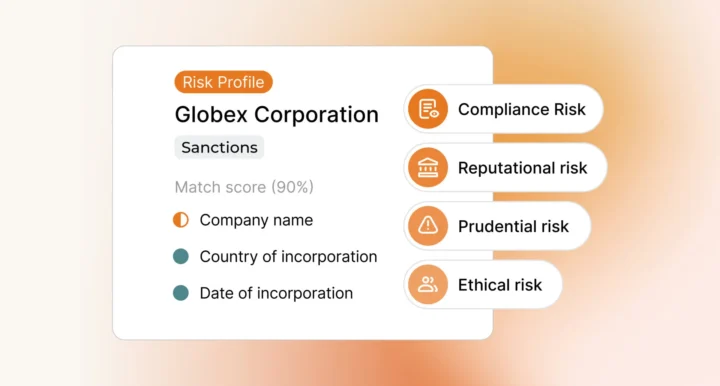On 18 January 2024, the EU Parliament and EU Council reached a landmark agreement on the ‘single AML rulebook’, a regulatory proposal intended to strengthen and harmonise anti-money laundering (AML) and counter-financing of terrorism (CFT) regulations across EU member states. Fintech experts commented positively on the announcement, emphasising the importance of effective cross-border AML/CFT measures in addressing the global reach of financial criminals. That criminal threat remains significant, with authorities detecting up to €210 billion in suspicious transactions and activities in the EU alone every year.
The 2024 agreement on the single AML rulebook is part of a wider EU AML/CFT package, which includes an update to the Sixth Anti-Money Laundering Directive (6AMLD) and new compliance rules for businesses. With EU administrators now resolving the final details, organisations across the EU should ensure that they understand the new rules, and their new 6AMLD compliance obligations and, if necessary, prepare to adjust their AML/CFT solutions.
To help your business stay ahead of compliance risk, read our update on the EU’s single AML rulebook – and its key regulatory impacts.
What is the Single AML Rulebook?
The single AML rulebook was originally proposed in a European Commission (EC) action plan in 2020, and has gone through several stages of development. The January 2024 agreement signalled political consensus for the regulatory provisions that the rulebook will introduce, supporting the EU’s ultimate goal of harmonising its AML/CFT environment for its 27 members. These provisions include new and expanded AML/CFT rules, and reforms to existing rules that address weaknesses and loopholes.
Supporting the Updated 6AMLD
The single AML rulebook codifies rules and obligations included in the updated 6AMLD, which places a strong focus on boosting powers to detect and address money laundering methodologies. As part of the update, 6AMLD now guarantees access to national beneficial ownership registries for parties with ‘legitimate interest’ – such as journalists and academics. Similarly, the updated 6AMLD will give financial intelligence units (FIUs) expanded powers to suspend suspicious transactions.
The Single AML Rulebook: Key Highlights
The key regulatory provisions of the single AML rulebook include:
Expanded AML Rules
The single rulebook expands AML/CFT rules to apply to a wider range of organisations, including professional football clubs, football agents, traders in cultural goods (such as artwork), luxury car dealers, yacht dealers, and private jet dealers. Under the expanded rules, these entities will need to perform customer due diligence (CDD) on customers and clients, monitor their transactions for suspicious activity, and report such activity to the relevant authorities.
Crypto AML
The rulebook also expands the scope of EU AML/CFT rules to apply to crypto asset service providers (CASP) and virtual asset service providers (VASP). The rules must be applied to customers that engage in transactions involving €1,000 or more.
Very Wealthy Customers
The updated AML rules include an obligation for financial institutions to conduct enhanced due diligence (EDD) on “very wealthy (high net-worth) individuals”, when the business relationship involves “the handling of a large amount of assets”.
Cash Payment Rules
The rulebook sets a limit of €10,000 for cash payments. As an added rule, firms will need to apply CDD measures to verify the identities of persons that carry out occasional transactions between €3,000 and €10,000.
Beneficial Ownership Rules
The rulebook sets the EU threshold for establishing beneficial ownership. Under the rules, a person may be considered a beneficial owner if they own 25% or more of an entity. The 2024 agreement emphasises that the beneficial ownership assessment process must take into account both “ownership and control”, and clarifies certain rules to prevent persons from hiding their status “behind multiple layers of ownership”.
A proposal to lower the beneficial ownership threshold to 15% was not implemented in the single AML rulebook.
Implementation Timeline: What Next?
While the 2024 agreement was an important step forward in achieving the EU’s vision of consistent, region-wide application of AML rules and sanctions, the updated 6AMLD’s rules, and the corresponding single AML rulebook, will not be implemented immediately. The text of the rulebook agreement must now be reviewed by member-state representatives, before it is formally adopted by the EU Council and EU Parliament.
Given the current rate of progress (notwithstanding unexpected delays), businesses may expect the 2024 agreement to be formally adopted by late 2025, with rules coming into effect in early 2026. Some of the new rules have clearer implementation schedules: the expansion of AML rules to professional football clubs, for example, are slated to come into effect in 2029.
Prepare Your Business for Regulatory Change
The EU’s primary objective with the single AML rulebook has always been to increase regulatory harmony, facilitating a stronger and more efficient collective response to global financial crime. However, regulatory disparity across jurisdictions means that many firms will be exposed to new compliance risks, and will need to review their existing AML procedures to meet 6AMLD standards.
Keeping up with EU AML standards can be daunting, especially in periods of regulatory change when firms must quickly adjust to new data collection obligations in order to establish risk accurately. Ripjar developed Labyrinth Screening to meet that challenge: an automated, AI-powered screening solution, Labyrinth Screening enables firms to customise their screening process to their risk environment, performing customer name searches in seconds, in 25+ languages, across thousands of global news sources, sanctions lists, and watchlists.
AI-Powered AML Name Screening
Labyrinth Screening keeps the AML compliance process fast and simple. Integrating Ripjar’s cutting-edge AI Risk Profiles feature, Labyrinth is capable of identifying and extracting the most relevant risk information from vast amounts of data, in order to build easy-to-read customer profiles, reduce time-consuming duplications and false positive alerts, and enable strong, speedy compliance decision-making that saves customers and compliance teams time.
The recently-launched AI Summaries extension, has made Labyrinth Screening even more effective. Adding a concise narrative overview to each customer risk profile, AI Summaries supercharges individual name searches – with up to a 90% reduction in risk assessment time for both new and existing customers. Combined with AI Risk Profiles, AI Summaries ensures that companies in the EU and beyond stay ready for regulatory change, and are able to react to unexpected compliance challenges in an evolving risk landscape.
Find out how Ripjar’s AI technology can enhance your adverse media screening process
Last updated: 6 January 2025





